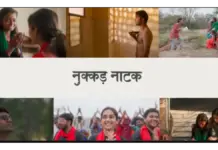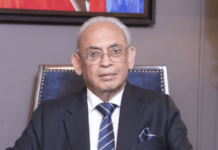Y-Films’ Mere Dad Ki Maruti (UA) is a story of the relationship between a young man, Sameer Khullar (Saqib Saleem), and his dad, Tej Khullar (Ram Kapoor), who live in Chandigarh. Tej thinks, his son is good for nothing and is generally after him for work not done or badly done. Sameer’s sister, Tanvi (Benazir Shaikh), is due to get married to Raj (Karan Mehra), so there is an atmosphere of celebrations in the Punjabi Khullar household. Tej buys a Maruti Ertiga car to gift his daughter and son-in law on the day of their wedding.
In a bid to woo college girl Jazzleen (Rhea Chakraborty), Sameer takes her out in the brand new Maruti car, of course, without his father’s knowledge. As bad luck would have it, his car gets stolen. Sameer is in a fix. With just three days left for his sister’s wedding, he and best friend Gattu (Prabal Punjabi) are at their wits’ end. They go to the police station but return without filing a complaint for fear that the news of the car theft would reach Sameer’s father. They then go to the Maruti showroom and try to buy the expensive car by making a down payment of a few thousand rupees. Of course, they are turned away. They also take a similar-looking Maruti Ertiga on rent for a few hours to keep the façade that nothing was amiss, going. Why, they also contact Hussainbhai (Ravi Kishan) who deals in stolen cars, and finalise a deal for a secondhand car for half the price of a new car. But they soon realise that they don’t have the money to pay Hussainbhai who, incidentally, is an underworld don and is pressurising them for the money.
Meanwhile, there’s the constant fear that Sameer’s dad or other family members would learn of the theft. Finally, it is the day of the marriage with no solution in sight for Sameer, Gattu and Jazzleen who, by now, has learnt of the mess-up. To make matters worse, Sameer is caught by the police for trying to buy a stolen car from Hussainbhai.
What happens then? Does Sameer have to cut a sorry figure in front of the guests at the wedding? Does his dad do something to save the situation? What do Gattu and Jazzleen do? Does anybody come to Sameer’s rescue? Is the stolen car found?
Neeraj Udwani’s story may be simple but it has all the trappings of a family entertainer. The best part of his story is that its grammar is absolutely correct. The screenplay, written by Neeraj Udwani, Pooja Desai and Ashima Chhibber, adds so brilliantly to the story that the film turns out to be a laugh riot. The three writers deserve kudos for creating the Punjabi and the Chandigarh atmosphere brilliantly. They also deserve a pat on their backs for penning a strong beginning, a stronger middle and the strongest end. The jokes are so contemporary and young that the youth will fall in love with the film. No doubt, the language spoken by the characters (Sameer, Gattu and Jazzleen) is very contemporary and will, therefore, be liked more by the multiplex audience, but looking to the budget of the film (Rs. 10 crore all-inclusive), that should be more than enough. In their bid to make the audience laugh almost every minute, the writers have not forgotten to add emotions in the drama. The scene in which Sameer admits that although he may not be too fond of his father and sister, he can’t wrong them is so touching that the viewer will feel a lump in his throat. The scene in the climax, in which Sameer’s dad is firing him but underlining his love and concern for his son, is so beautiful that the weak-hearted will just not be able to control their tears. The climax, otherwise, is absolutely hilarious and totally unpredictable.
A word here about the characterisations. The writing trio has done a swell job of the characterisations because every main character has something cute or adorable and typical about him/her.
If the screenplay writers have come out with flying colours, so has dialogue writer Ishita Moitra. She is as much the hero of the film as anybody else associated with it. Her choice of words and lines is excellent. Punch-lines like ‘Gareeb hai’, ‘Waste phael gayi’ etc. will go down fabulously well with the youngsters.
Saqib Saleem is earnest and efficient and acts with admirable ease. He instantly endears himself to the audience with his easy disposition. Rhea Chakraborty makes an impressive debut. She looks glamorous and carries off the role of Jazzleen with just the right attitude. Ram Kapoor is truly terrific as Sameer’s dad. He leaves a mark in every scene he appears. Why, even his dance in the ‘Punjabiyaan di battery’ is so graceful. Prabal Punjabi does a spendid job in the role of Gattu. He looks the timid character he plays and his facial expressions, body language and dialogue delivery are to die for. He is a superb actor. Ravi Kishan stands out in a brief role with his restrained acting. Ritu Khanna Vij lends able support as Sameer’s mother. Benazir Shaikh is fine as Tanvi, sister of Sameer. Her dance is absolutely hilarious – just like the lyrics (Kumaar) of the song on which she dances. Karan Mehra, who plays Raj, has screen presence and also acts ably. Nidhi Shah shows talent in the ‘Excuse me’ scenes. Raghuvinder Malik (as Chhote Saheb) and Dariyav Singh (as Bade Saheb) provide fair support. Silky Khanna stands out as Mrs. Khosla. Gulshan Pandey (as cop Sandhu), Jatinder Vashist (as cop Kartar), Sunny Gill (as cop Devender), Sanjay Choudhary (as Irfan), Simran Singh (as Mika), Savita Bhatti (in the role of Honey maasi), Sukhvinder Chachal (as Mr. Khosla), Satvinder Singh (as the car salesman), Sanjivani A. Ogale (as Beeji), Tarun Chouhan (as Gehlot), Anil Megon (as Raj’s father) and Rani Kochar (as Raj’s mother) lend lovely support. Others are adequate.
Ashima Chhibber makes a solid mark as director in her maiden film. She has extracted wonderful work from her actors and has also made a very entertaining fare for the families, especially the youth. With dollops of fun and frolic, she has added just the right dose of emotions for the audience. Sachin Gupta’s youthful music and Kumaar’s lovely lyrics complement each other. ‘Punjabiyaan di battery’ is a hit song. ‘Main senti tha’ is also lovely. The ‘Maruti’ song and several other numbers are appealing. There are many short background songs and must say, they go well with the drama. Rajeev Surti’s efforts in the picturisation of songs deserve to be applauded. Sachin Gupta’s background score suits the proceedings very well. Adil Afsar does a fine job of the camerawork. Parichit Paralkar’s sets are nice and look real. Antara Lahiri does a lovely job of the editing.
On the whole, Mere Dad Ki Maruti is a wonderfully entertaining film for the entire family. While the older generation will like it, youngsters will love it. A section of the youth would also repeat the film. It may have taken a very poor start (due to absence of big names in the star cast and the opposition of examinations) but the positive word of mouth will work wonders for the film as collections will take a giant leap in the big cities. The film has cost around Rs. 10-12 crore to make, promote and release, of which around 70-80% has already been recovered from in-film placements and sale of satellite rights. Recovery of the balance investment should not be difficult. But had the film been released at a more opportune time (without the opposition of examinations), the revenues would have been so big that the film would, in the final tally, have qualified to be termed a hit! Eighty per cent of the business will come from multiplexes and the big cities.
Released on 15-3-’13 at Regal (daily 1 show), Inox (daily 5 shows), New Excelsior (daily 1 show) and other cinemas of Bombay by Yash Raj Film Distributors. Publicity: very good. Opening: poor. …….Also released all over. Opening was very weak everywhere.




























